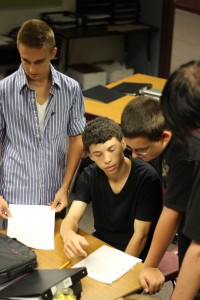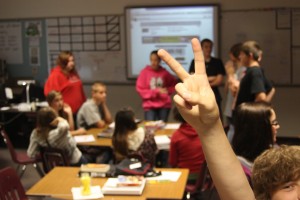
The 4th week of school is over, and debate is about to start in my classroom — and yet, we've already had two debates.
Here's the thing: to build argumentative ballers over the course of the year, I'm experimenting with a new idea this year: start slow. And so I've actually started debates this year without actually debating.
Our first “debate”
On Day 9 of school (two weeks ago), we had our first in-front-of-the-class showdown (but, as I'll explain, it wasn't really a showdown at all).
A bit of info:
- Question: Should the US strike Syria in response to Assad's use of chemical weapons?
- Format:
- Sides were assigned by me (I just split the class in half).
- To receive credit for our first “debate,” students had to:
- State their point.
- Give at least one reason to support their point.
- Students were given 10 minutes to consult their notes and their written responses to the article of the week, and to plan their “speeches” (which I explained aren't as scary as they sound; they're just the moment that the student speaks).
- Students could come up to the front with groups of 2-4.
- Teams alternated sending up groups until both sides had sent everyone up.
The results were par for the course for an initial debate. Like previous years, I had students who were petrified to the point of intense physical discomfort (I believe “I thought I was going to pee myself” is a direct quote), and I had students who considered themselves great at speaking in front of people and learned they've got a ways to go. Also like previous years, I saw glimmers of greatness as I watched students speak, and I also saw some major rough spots.
We also practiced some appropriate methods for showing respect for a great speech (e.g., standing up and making a motion next to your head like your brain just exploded and falling back into your seat), and at the end of it, every single kid (a few with me calling them up and having them stand next to me) did the debate.
So why was it a “debate” but not a no-quotation-marks debate?
Quite simply, the kids weren't arguing at all. They were arranged on different teams, they alternated turns in speaking, but they literally could receive credit for not listening to a word anyone else said. And that was intentional.
My goals for this activity were to:
- Start drawing my glossophobes (I had to ask a kid what he meant when he said, “I have glossophobia”) into the thrilling, terrifying realization that everyone has some level of fear about speaking in public and that everyone can both improve and celebrate aspects of any given speaking situation;
- Give students a baseline to begin reflecting on their abilities as speakers; and
- Have fun doing one of the most underrated things any content-area teacher can provide space and time to do: argue.
But this would be a miserable place to keep aiming for debate, because they aren't actually debating.
I would argue the most critical part of an argument isn't the speaking part; it's the listening, understanding, and figuring out what to do with someone else's viewpoint.
I will be open and honest to admit that, too often, my students have not gotten here; they have focused too much on the game-like elements of debate and, ironically, this has made them mediocre at the game. You see, you can't really argue with anyone until you've fully understood and weighed their argument. You can start an argument without doing this, and you can take turns talking without doing this, but you can't freaking argue without doing this. (Tweet that. That needs to spread. Ask Jerry Graff if you don't believe me.)
One more thing: after this debate was over, we had about five minutes, so I asked students to get a sheet of paper and write one element of their performance today that they were proud of and one element that they want to work on for next time. I saved these sheets of paper and will let students add to them in a few weeks.
Our second “debate”
So today, the 19th day of the school year, we had another quasi-debate.
Info on this one:
- Question: Is democracy fragile like an egg or durable like a rock?
- Format:
- Sides were assigned by me again.
- To receive credit, students had to:
- State their point or respond to someone else's point.
- Give evidence to support their point.
- Cite their evidence.
- Students were given 20 minutes to consult both their notes and the Internet (*gulp*) to plan their speeches.
- Students could come up to the front with groups of 2-4.
- Teams alternated sending up groups until both sides had sent everyone up.
Notice the increase in requirements and the newly suggested path of response. My goals with this one are similar but not identical to the first:
- Build confidence in glossophobes;
- Practice finding reliable evidence and citing sources (looking back on it now, I think this was too much to bite off, but we went for it);
- Have fun doing something that too many teachers aren't employing enough: arguing our faces off.*
*But we weren't actually arguing, were we?! Some of my students did opt to respond to others, and we had exactly two goosebumps moments where a student came up, showed poise and thoughtfulness and logic and beauty (which inspired a few kids to stand up and do the exploding brain thing taught in the first debate). And yet, this wasn't arguing.
Next week — yes, next week! — is when the awesomeness will truly begin.
Why? Because I'll be giving students credit based on their ability to paraphrase and respond to another argument. Today I taught them the concept of flowing — of taking notes on the debates — but there was little incentive to do it. Next week, that will all change.
Start it. Try it. Do it.
Look, I know it can be scary doing a debate, and frankly it is. I have seen these things go wrong more times than I can count.
But pound for pound, minute for minute, debates deliver more teachable moments, more writing connections, more motivation, more wow-factor, more student mindset shifts, and more results than just about anything else that I do in my classroom.
Don't read me wrong: they can't be all that we do. But they should be a regular occasion. I'd aim for once a month at least.
So how's debate going in your room? Are you trying it? Are you crushing it? Is it ruining your life? Share in the comments. Take care, all.

Adelia says
hey, I’d really like to see those slides you’re giving them… how is that working for you now? Have those skills developed? I have been trying to get my students to write their arguments about things that they actually care about, or at least, I thought they cared. However, only a few have actually grasped the concept of refuting a point and using logical, valid evidence. Many leave MUCH to be desired. Nonetheless, there’s been some progress. I want them to become comfortable with actually talking.